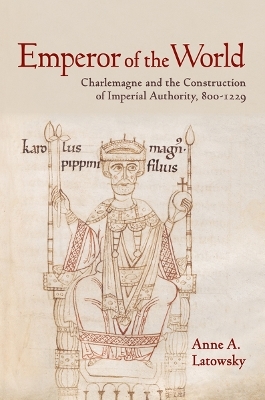
Emperor of the World
Charlemagne and the Construction of Imperial Authority, 800–1229
Seiten
2013
Cornell University Press (Verlag)
978-0-8014-5148-5 (ISBN)
Cornell University Press (Verlag)
978-0-8014-5148-5 (ISBN)
Exploring how the historical memory of Charlemagne was used to shape the institutions of kingship and empire in the High Middle Ages.
Emperor of the World, traces the curious history of the story of the alliances forged by Charlemagne while visiting Jerusalem and Constantinople, revealing how the memory of the Frankish Emperor was manipulated to shape the institutions of kingship and empire in the High Middle Ages.
The legend incorporates apocalyptic themes such as the succession of world monarchies at the End of Days and the prophecy of the Last Roman Emperor. Charlemagne's apocryphal journey to the East increasingly resembled the eschatological final journey of the Last Emperor, who was expected to end his reign in Jerusalem after reuniting the Roman Empire prior to the Last Judgment. Latowsky finds that the writers who incorporated this legend did so to support, or in certain cases to criticize, the imperial pretentions of the regimes under which they wrote. Latowsky removes Charlemagne's encounters with the East from their long-presumed Crusading context and shows how a story that began as a rhetorical commonplace of imperial praise evolved over the centuries as an expression of Christian Roman universalism.
Emperor of the World, traces the curious history of the story of the alliances forged by Charlemagne while visiting Jerusalem and Constantinople, revealing how the memory of the Frankish Emperor was manipulated to shape the institutions of kingship and empire in the High Middle Ages.
The legend incorporates apocalyptic themes such as the succession of world monarchies at the End of Days and the prophecy of the Last Roman Emperor. Charlemagne's apocryphal journey to the East increasingly resembled the eschatological final journey of the Last Emperor, who was expected to end his reign in Jerusalem after reuniting the Roman Empire prior to the Last Judgment. Latowsky finds that the writers who incorporated this legend did so to support, or in certain cases to criticize, the imperial pretentions of the regimes under which they wrote. Latowsky removes Charlemagne's encounters with the East from their long-presumed Crusading context and shows how a story that began as a rhetorical commonplace of imperial praise evolved over the centuries as an expression of Christian Roman universalism.
Anne A. Latowsky is Associate Professor in the Department of World Languages at the University of South Florida.
Introduction
1. Carolingian Origins
2. Relics from the East
3. Benzo of Alba's Parallel Signs
4. In Praise of Frederick Barbarossa
5. The Emperor's Charlemagne
6. "Charlemagne and the East" in France
Epilogue: The Remains of CharlemagneBibliography
Index
| Zusatzinfo | 2 Maps; 3 Halftones, black and white |
|---|---|
| Verlagsort | Ithaca |
| Sprache | englisch |
| Maße | 155 x 235 mm |
| Gewicht | 907 g |
| Themenwelt | Literatur ► Biografien / Erfahrungsberichte |
| Sachbuch/Ratgeber ► Geschichte / Politik | |
| Geschichte ► Allgemeine Geschichte ► Mittelalter | |
| Geisteswissenschaften ► Geschichte ► Regional- / Ländergeschichte | |
| Geschichte ► Teilgebiete der Geschichte ► Wirtschaftsgeschichte | |
| Geisteswissenschaften ► Sprach- / Literaturwissenschaft ► Anglistik / Amerikanistik | |
| Sozialwissenschaften ► Politik / Verwaltung | |
| ISBN-10 | 0-8014-5148-5 / 0801451485 |
| ISBN-13 | 978-0-8014-5148-5 / 9780801451485 |
| Zustand | Neuware |
| Haben Sie eine Frage zum Produkt? |
Mehr entdecken
aus dem Bereich
aus dem Bereich
eine neue Geschichte des Mittelalters
Buch | Hardcover (2023)
C.H.Beck (Verlag)
CHF 53,20


